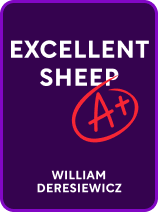

This article is an excerpt from the Shortform book guide to "Excellent Sheep" by William Deresiewicz. Shortform has the world's best summaries and analyses of books you should be reading.
Like this article? Sign up for a free trial here.
Are prestigious schools the best schools? What should parents and students look for when selecting a college?
In his book Excellent Sheep, William Deresiewicz claims that elite U.S. colleges and universities are so selective and profit-oriented that they perpetuate social inequality and deprive students of high-quality learning. He argues that the solution is to make high-quality college education accessible to all U.S. students.
Keep reading for an overview of the book, along with an exercise to review the content.
Excellent Sheep
Elite colleges and universities accept on average only 6% of applicants, but their influence stretches far beyond this small group. Deresiewicz, a former English professor at Yale, is well-known for his 2008 essay “The Disadvantages of an Elite Education.” After the article went viral, he further fleshed out its ideas in his book Excellent Sheep. His book draws on historical research, his observations from 15 years at Ivy League schools, and his conversations with college students. Although Deresiewicz primarily addresses an audience of elite parents and students, the topics he covers—from social inequality to developing self-insight—are relevant to any reader.
(Shortform note: The author uses the term “excellent sheep” to describe these college students. They’re “excellent” because they seek experiences that make them appear accomplished, and they’re “sheep” because they don’t stray from this approach even when opportunities for self-insight arise. In this guide, we’ll refer to these students as “fearful followers” to emphasize that selective criteria have made them so fearful of failure that they follow existing, perfectionism-driven pathways instead of charting their own.)
We’ll begin by exploring Deresiewicz’s vision for an ideal college education and considering how it benefits students and upholds democracy. Next, we’ll contrast his vision with reality: We’ll examine two ways elite colleges and universities perpetuate social inequality and deprive students of this ideal education. Finally, we’ll turn to solutions by describing how governments, schools, and parents can collectively overhaul U.S. higher education—and how today’s students can make the most of their college years in the meantime.
What Is a High-Quality College Education?
According to Deresciewicz, an ideal college experience benefits both individuals and society. He argues that a high-quality college education is a liberal arts program that nurtures students’ self-insight and equips them with the skills to uphold democracy. In this section, we’ll define what a liberal arts education is. Then, we’ll explore how it benefits students and society.
What Are the Liberal Arts?
Deresiewicz claims that the liberal arts prioritize character-building over career development. Their students still graduate prepared for the workforce. He cites research showing that many employers specifically seek graduates of liberal arts programs because these alumni demonstrate strong problem-solving and relational skills.
How the Liberal Arts Benefit Students
Deresiewicz argues that the liberal arts’ emphasis on character development nurtures students’ self-insight, which enables them to build a meaningful life. Liberal arts professors encourage students to engage in self-insight by providing opportunities for self-reflection as they study the world.
How the Liberal Arts Uphold Democracy
The skills students develop in liberal arts programs benefit society as well. Specifically, Deresiewicz argues that liberal arts programs equip students with skills that enable them to uphold democracy. These skills include imagining a better future, communicating that vision, and collaborating with others to make it happen. Skills like these prepare students to contribute meaningfully to democracy because democracies thrive when citizens together envision a better society and take action to make it a reality.
Liberal arts professors develop these skills in students by cultivating their self-insight, pushing them to question their long-held beliefs, exposing them to diverse perspectives, and teaching the art of crafting strong arguments.
Problem 1: Selective Admissions Criteria
Deresiewicz identifies two main problems with elite U.S. schools (prestigious, highly-selective colleges and universities). The first problem is these schools’ admissions criteria. Deresiewicz claims that admissions criteria at elite U.S. schools are so selective that they both harm students and perpetuate social inequality.
Why Elite Schools Use Selective Admissions Criteria
According to Deresiewicz, elite schools use selective admissions criteria because they stay in business by marketing themselves as highly selective. Doing so offers them a competitive advantage over less-selective schools. Elite schools strive to admit qualified, upper-class students because they and their families are likely to pay full tuition and later become donors.
Furthermore, elite schools keep their acceptance rates low by attracting a high number of applicants. As a result, their admissions criteria are exceedingly selective.
Next, let’s explore how these selective admissions criteria harm students.
Effect 1: Intense Pressure Harms Prospective Students
Deresiewicz claims that, as students prepare to meet highly selective criteria, they feel intense pressure to prioritize achievement over experiences that build self-insight. This takes a toll on their mental health. The author criticizes parents for pressuring their children as early as middle school to be perfect so they’re prepared to meet selective admissions criteria.
Effect 2: Admitted Students Become Fearful Followers
Even after students are admitted to U.S. elite colleges and universities, the legacy of selective criteria continues to harm them. Deresciewicz argues that college students continue to prioritize achievement over self-insight. This emphasis further degrades their mental health and makes them afraid to pursue their own interests.
Let’s examine several reasons why students at elite colleges continue to prioritize achievement over self-insight.
Reason 1: Proving They Belong
First, students at elite colleges feel the need to prove they belong because, after they’re admitted, they realize their peers are equally as exceptional as they are. To prove their worth, they compete with their peers: They pursue experiences that make them appear more accomplished instead of experiences with peers that develop self-insight.
Reason 2: Avoiding Failure
The second reason college students continue to prioritize achievement is that elite schools make little effort to deprogram students’ perfectionism. Students sign up for classes they think will be easy and avoid classes and majors that would carry a risk of failure. To them, classes and majors that prioritize career development (such as finance) seem like a safer choice. As a result, many students miss out on the benefits of liberal arts.
Effect 3: Fearful Followers Become Ineffective Leaders
After these fearful followers graduate from elite schools, their impact is widespread. Deresiewicz notes that many fearful followers become leaders, citing evidence that a disproportionate number of U.S. government and business leaders are alumni of elite schools. More concerningly, he argues that many fearful followers become ineffective leaders.
Effect 4: Exclusion of Non-Elite Students
So far, we’ve discussed how selective criteria shape the lives of admitted students and alumni. Next, we’ll consider the students who aren’t admitted. According to Deresiewicz, elite schools’ criteria are so selective and narrowly defined that mostly only upper-class students have the means to meet them. He argues that this exclusion of non-elite students perpetuates social inequality.
Four Factors That Exclude Non-Elite Students
Admissions teams consider the following factors, each of which privileges upper-class students:
- Standardized test scores
- Leadership experience
- Extracurriculars
- Social identities
Why the Exclusion of Non-Elite Students Perpetuates Social Inequality
The exclusion of non-elite students through these high, narrow criteria negatively impacts society. Specifically, Deresiewicz argues that elite schools’ exclusive admissions criteria stall social mobility. He offers two main reasons for this.
First, selective criteria that exclude non-elite students reduce their access to leadership positions. Second, they limit students’ opportunities for collaboration across social classes because elite colleges’ student bodies are majority upper class.
Problem 2: Elite Schools Prioritize Profits Over Teaching
Next, we’ll turn to the second problem with elite colleges and universities: the low quality of their academic programs. Deresiewicz argues that elite schools provide a low-quality education because they concern themselves more with generating profits that ensure their future existence than with the art of teaching. In this section, we’ll explore two ways elite schools prioritize profits over teaching. Then, we’ll investigate how this emphasis harms students and society.
Elite Schools Prioritize Profits Over Teaching
The first way elite schools prioritize profits over teaching is by treating students like customers instead of learners by attracting them with unnecessary perks (such as free laundry service) that don’t improve the quality of education. After students are admitted, elite schools maintain their customer satisfaction in two ways. They praise them excessively for their exceptional abilities, and they engage in grade inflation—giving them higher grades than they deserve.
A second way elite schools prioritize profits over teaching is by overemphasizing research. Deresiewicz argues that because professor-led research brings in funding, elite schools reward professors for research more than for teaching.
Next, let’s explore how elite schools’ focus on profits harms both students and society.
The Negative Effects of Elite Schools’ Focus on Profits
First, Deresiewicz argues that, because research is so time-consuming, professors are unavailable to provide students with experiences that encourage self-insight and character-building. They provide students with facts and conclusions instead of opportunities to develop their own insights and conclusions.
Second, Deresiewicz argues that elite schools’ treatment of students as customers reinforces harmful myths about meritocracy that perpetuate social inequality. The author claims that, when elite schools shower their customer-students with praise about how exceptional they are, it sends students the message that they earned their place in the meritocracy. However, this message is a myth. The U.S. isn’t a meritocracy because, as previously noted, affluent students with merit have more access to elite schools than non-affluent students with merit. This myth of meritocracy obscures the truth that social inequality, not lack of merit, excludes non-elite people, making it less likely that this inequality is addressed.
Solution 1: Expand Access to Higher Education
Next, we’ll turn to Deresiewicz’s ideas on how to realize his vision of an ideal college education. We’ll begin by examining his solution to the first problem we discussed earlier: elite schools’ selective, exclusive admissions criteria. He proposes that Americans should replace their current system of higher education with a less-exclusive one that no longer privileges upper-class children. In this section, we’ll describe Deresiewicz’s recommendations for how governments, institutions of higher education, and parents can play a role in this solution.
Government Role: Address the Roots of Disparities in College Access
The author claims that high school students will have equal opportunities to access high-quality education if the government equally funds all public schools.
College and University Role: Overhaul Admissions Criteria
Next, Deresiewicz argues that elite schools should replace their admissions criteria with criteria that no longer privilege the students of wealthy families. Deresiewicz recommends college admissions teams overhaul their admissions criteria using three specific methods.
- Method 1: Eliminate bias toward wealthy students. He recommends that admissions criteria show no bias towards students with social identities associated with wealth. To replace criteria that privilege wealthy students, the author recommends schools instead show a preference toward students with personality traits that signal they’ll be strong citizens and changemakers, such as students with original, creative ideas.
- Method 2: Use class-based affirmative action. Deresciewicz claims that elite schools should increase equity by replacing their race-based affirmative action with class-based affirmative action. The students of color elite colleges admit typically come from wealthy families.
- Method 3: Use weighted standardized test scores. Deresciewicz recommends elite schools overhaul their admissions criteria by replacing regular standardized test scores with weighted ones. Weighted standardized test scores are adjusted to reflect a student’s income level. The author argues this is a better measure of achievement than unweighted standardized test scores since unweighted scores correlate with family income.
Family Role: Stop Giving Your Child an Advantage
Finally, Deresiewicz believes that elite parents have a role to play in improving U.S. higher education. He argues that parents of elite children should stop prioritizing the needs of their kids over those of less-affluent kids. He claims that, when upper-class parents try to increase their children’s chances of getting into elite colleges, they make their children miserable and give their kids an unfair advantage.
Solution 2: Prioritize Teaching and Learning
Next, let’s consider solutions to the second problem with elite schools: their emphasis on profits over teaching. Deresiewicz offers recommendations for how colleges and universities, and college students themselves, can improve students’ educational experience. In this section, we’ll share his recommendations.
College and University Role: Prioritize Teaching
The author argues that elite schools should ensure that professors prioritize teaching over research. Shifting professors’ priorities would enable them to build students’ character and nurture their self-insight. The author argues that, during the tenure evaluation process, professors’ teaching experience and strengths should be valued just as much as, or more than, their research experience.
Student Role: Prioritize Learning Over Prestige
Deresciewicz claims that college-age students don’t need to wait for these systemic changes to happen before they can experience a high-quality education. He urges students to actively create a high-quality education for themselves. Specifically, he encourages them to undermine the priorities of elite schools by prioritizing learning over prestige. By seeking experiences that prioritize learning, they can experience the benefits of self-insight and character-building. In this section, we’ll share Deresciewicz’s tips for how prospective and current college students can achieve this.
Tips for Prospective College Students
First, Deresciewicz advises prospective college students to disregard rankings and prestige. Instead, he implores students to attend second-tier liberal arts colleges and liberal arts colleges that are housed within public universities. He claims these schools are more likely to value a high-quality education over reputation.
Deresciewicz’s second tip for prospective college students is to shadow a current student at a college in which they’re interested to preview its culture and academic programs. He encourages them to look for evidence that the school deeply values learning.
Tips for Current College Students
Deresciewicz argues that current college students can also actively create a high-quality education for themselves. In this section, we’ll share three of his tips for doing so.
- He recommends that college students connect with inspiring professors. They should attend these professors’ office hours to receive extra guidance on their journey towards self-insight.
- The author urges college students to follow their interests instead of automatically gravitating toward prestigious careers such as finance.
- Deresciewicz advises college students to expect and embrace failure. They’ll make progress on their path towards self-insight if they learn from failure rather than fear it.
Exercise: Review What You’ve Learned From Excellent Sheep
Take some time to review the main takeaways from Excellent Sheep.
- The author describes how elite schools’ selective criteria and their focus on profits negatively affect students. Which of these effects was the most surprising or disturbing to you? Why?
- The author also describes how elite schools’ selective criteria and their focus on profits negatively affect society. Which of these effects was the most surprising or disturbing to you? Why?
- The author proposes a variety of solutions for reducing elite U.S. schools’ negative effects on students and society. Which of these solutions do you think would be most successful? Why?
- What role could you play in any of these solutions the author proposes? (For example, consider any high schools or colleges in your neighborhood. How could you encourage these schools to prioritize teaching experiences that nurture self-insight? How could you advocate for making access to these schools more equitable?)

———End of Preview———
Like what you just read? Read the rest of the world's best book summary and analysis of William Deresiewicz's "Excellent Sheep" at Shortform.
Here's what you'll find in our full Excellent Sheep summary:
- How elite colleges contribute to social inequality and harm students
- The ways that elite schools prioritize profits over teaching
- How governments, schools, and parents can overhaul U.S. higher education






